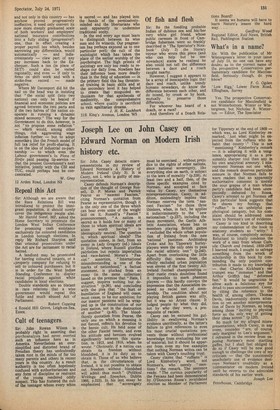Joseph Lee on John Casey on Edward Norman on Modern Irish history etc.
Sir: John Casey detects misrepresentations in my review of Edward Norman's A History of Modern Ireland (July 3). It is Casey, not I, who is guilty of misrepresentation.
Casey defends Norman's description of the thought of George Russell, D. P. Moran and Patrick Pearse as "nascent Fascism," citing Norman's quotation from Pearse as representative, though it is the only one of the three which can bear even some of the weight laid on it. Russell's " Fascist" pronouncement, "A nation is sacred as it holds few or many of those to whom spiritual ideals are alone worth having" is ideologically neutral. The question is, which spiritual ideals? The quotation comes, in fact, from an essay in Lady Gregory (ed.) Ideals in Ireland, where Russell glorifies patriotism but rejects imperialism and race-hatred. Moran's "Fas
cist " assertion, " International misunderstanding is one of the marks of nationhood," a factual statement, is plucked from an essay (in the same collection) based on the premise that "Hate, I suggest, inspires nothing but destruction" (p.36), and concluding with the plea that "the hurt or humiliation of England will cease, must cease, to be our ambition; for our master passions will be wrapped up in the construction of our own nation, not in the destruction of another" (p.40). The bloodthirsty quotation. from Pearse, the only one on which a meaning is not forced, reflects his devotion to the heroic cult. He held none of the other Fascist tenets, and even his attitude and heroism evolved significantly between this quotation, in 1913, and 1916, when he wrote: "Obviously, if a nation can obtain its freedom without bloodshed, it is its duty so to obtain it. Those of us who believe that, in the circumstances of Ireland, it is not possible to obtain out freedom without bloodshed will admit thus much" (Political Writings and Speeches, Dublin 1966, p.323). In his last essay he emphasised that "sovereignty must be exercised ... without preju, dice to the rights of other nations, since national sovereignty, like everything else on earth, is subject to the laws of morality" (p.338). At least two and a half, then, of the three specific examples cited by Norman, and accepted at face value by Casey, are themselves misrepresentations. Casey, in addition, misleadingly implies that Norman reserves the term " nascent Fascism" for those three thinkers, when, in fact, he applies it indiscriminately to the "new nationalism" (p.237), including the mass movement, the Gaelic Athletic Association, whose ban on members playing British games " excluded the whole urban population of Ireland from the new 'national' pastimes. Archbishop Croke and his Tipperary hurleyplayers were the only ones to pass the racial athletic test" (p.240). Apart from overlooking the little difficulty that teams from the wholly excluded urban population won eleven of the first twenty AllIreland football championships — their rustic rivals doubtless found it impossible to mark phantom players — this hardly conveys the impression that the Association imposed no racial test of membership. The condition about not playing British games was silly, but it was no Aryan clause. It judged people by what they did, not by who they were, a prerequisite of racism.
Casey can be excused his gullibility in swallowing Norman's evidence uncritically, as the latter's failure to give references to even his most crucial quotations prevents those without professional knowledge from evaluating his use of material, but it should be apparent from even my few examples that nothing Norman writes can be taken with Casey's touching trust. Casey claims that " ruffians " is Lord Kimberley's word, not Norman's, who merely " mentions " the remark. The sentence reads: "The curious popularity of the Fenians had been demonstrated by O'Donovan Rossa's invalidated election as Member of parliament
for Tipperary at the end of 1869 — which was, as Lord Kimberley remarked, just what might be expected from the ruffians who inhabit that county '." This is not " mentioning " Kimberley's remark — it is adopting it with a venglance, appropriating it as a presumably sharper tool than any in his own analytical armoury. I misrepresent Norman not one whit, and the remark deserves particular censure in that Norman fails to warn readers that an apparently authoritative comment is merely the sour grapes of a man whose party's candidate had been unexpectedly defeated by Rossa. Casey's attempt to get Norman off this particular hook suggests that he shares my feelings that " ruffian " is an unhelpful psephological category, but his complaint should be addressed once more to Norman's use of evidence.
Casey is too kind in describing my commendation of the book to anatomy students as "witty." I was, of course, completely serious. Reluctant to totally condemn the work of a man from whose Cathofic Church and Ireland, 1859-1873 I learned much, I sought to salvage something from the wreck of scholarship in this book by commending the only positive contribution it made to my knowledge — that Charles Kickham's ear trumpet was "immense " and that Arthur Griffith had "deformed feet." It would be ungracious to allow such a felicitous eye for detail to pass uncommended. Casey, by citing the reference to the health of, among others, Thomas Davis, inadvertently draws attention to yet another misrepresentation of Davis by Norman, as being among those "inciting to physical force as the only way of getting their ideas across "(p.120).
So much for my alleged misrepresentations, which Casey, in any event, concedes "are, of course, only marginal to Lee's argument." I refrained in the review from exposing Norman's most startling gaffes, but I shall feel obliged to do so if Casey will be now good enough to challenge the core of my criticism — that the consistently unscholarly use of evidence destroys Norman's credibility as a commentator on modern Ireland until he reverts to the admirable standards of his earlier work.
Joseph Lee Peterhouse, Cambridge










































 Previous page
Previous page